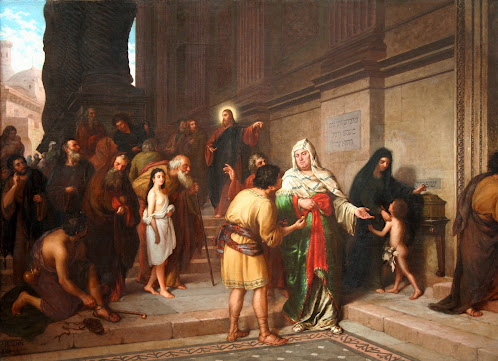They devour the houses of widows and, as a pretext
recite lengthy prayers.
They will receive a very severe condemnation.
Jesus warned against the dangers of using religiosity and a pretense of piety as a mask designed to win praise from others and to conceal a lack of love of neighbor. God himself had a heart for the poor and the marginalized. He would not allow himself to be used as an excuse for people to ignore their needs much less as an excuse for them to actually "devour the houses of widows".
He sat down opposite the treasury
and observed how the crowd put money into the treasury.
Many rich people put in large sums.
A poor widow also came and put in two small coins worth a few cents.
Although it was commendable in theory for the rich to put in large sums it seemed that they were only actually doing what came easily. They had the surplus available and it wasn't going to have much impact on their lifestyle. Gifts such as this did not require and therefore did not represent any kind of genuine conversion. They could in fact serve as pretense designed to conceal a lack of genuine contrition, just as the lengthy prayers of the scribes did for them. The offerings in themselves were not necessarily a bad thing. But a merely external act could not replace the need for one to die to self. As Paul reminded the church in Corinth: "If I give away all I have, and if I deliver up my body to be burned, but have not love, I gain nothing" (see First Corinthians 13:3).
The widow who gave the last of what she had was not going to impress anyone with the external act itself. In fact, many might chastise her for apparent foolishness or futility. It would seem that her two coins were insignificant for the service of God in the temple and imprudent for the widow herself to do without. It is hard for us to see her gift in anything other light than this cold and calculating perspective. But she saw things differently, through the logic of love, and with eyes of faith. She knew about the limited value anything in this world had in itself. She recognized that a gift only took on value when it was given with love. And she saw that nothing given out of love for God was ever wasted. Any apparently reckless gift given by a human was still less extravagant than the love with which God himself loved humanity. The evidence of this was that no human gift would ever match the perfect completeness found in the offering of Jesus Christ on the cross.
But now once for all he has appeared at the end of the ages
to take away sin by his sacrifice.
The cross was like the widow's mite in that both she and Jesus gave, from their poverty, all that they had, their entire livelihood. Both offerings appeared initially to be fruitless and futile. But we know from the offering of Jesus that the true result was the resurrection. We can be sure that an offering like that of the widow would also in some way lead to new life, whether here or in the world to come.
She answered, "As the LORD, your God, lives,
I have nothing baked; there is only a handful of flour in my jar
and a little oil in my jug.
The widow Elijah encountered at Zarephath was invited to make offering that would at first seem as imprudent as that of the widow Jesus praised in today's Gospel reading. They were both being invited, seemingly, to give the last of what they had. But the story of the widow to whom Elijah came highlights the fact that the invitation to give was not an invitation to give up. She was not asked to proceed in such a way that she in her son would starve. Rather she was asked to move beyond such natural calculations to a trust in supernatural abundance and providence.
For the LORD, the God of Israel, says,
'The jar of flour shall not go empty,
nor the jug of oil run dry,
until the day when the LORD sends rain upon the earth.
As an outsider appraising them, offerings of the best of what we have to God, offerings by which we genuinely invest, not only resources, but even ourselves, always seem foolish. But when we live in relationship with the God to whom we make such gifts we are able to see things differently. It is not despair that motivates us to give what is apparently too much. It is trust. It is love for the one who first gave all of himself for us.

No comments:
Post a Comment